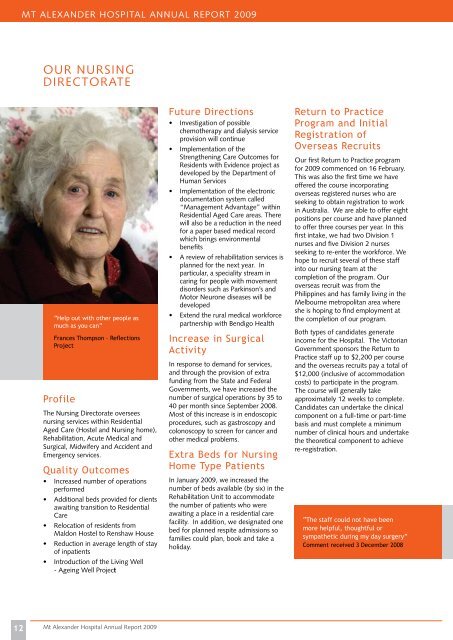Living well Ageing well - Castlemaine Health
Living well Ageing well - Castlemaine Health
Living well Ageing well - Castlemaine Health
Create successful ePaper yourself
Turn your PDF publications into a flip-book with our unique Google optimized e-Paper software.
12<br />
MT ALEXANDER HOSPITAL ANNUAL REPORT 2009<br />
OUR NURSING<br />
DIRECTORATE<br />
“Help out with other people as<br />
much as you can”<br />
Frances Thompson – Reflections<br />
Project<br />
Profile<br />
The Nursing Directorate oversees<br />
nursing services within Residential<br />
Aged Care (Hostel and Nursing home),<br />
Rehabilitation, Acute Medical and<br />
Surgical, Midwifery and Accident and<br />
Emergency services.<br />
Quality Outcomes<br />
• Increased number of operations<br />
performed<br />
• Additional beds provided for clients<br />
awaiting transition to Residential<br />
Care<br />
• Relocation of residents from<br />
Maldon Hostel to Renshaw House<br />
• Reduction in average length of stay<br />
of inpatients<br />
• Introduction of the <strong>Living</strong> Well<br />
- <strong>Ageing</strong> Well Project<br />
Mt Alexander Hospital Annual Report 2009<br />
Future Directions<br />
• Investigation of possible<br />
chemotherapy and dialysis service<br />
provision will continue<br />
• Implementation of the<br />
Strengthening Care Outcomes for<br />
Residents with Evidence project as<br />
developed by the Department of<br />
Human Services<br />
• Implementation of the electronic<br />
documentation system called<br />
“Management Advantage” within<br />
Residential Aged Care areas. There<br />
will also be a reduction in the need<br />
for a paper based medical record<br />
which brings environmental<br />
benefits<br />
• A review of rehabilitation services is<br />
planned for the next year. In<br />
particular, a speciality stream in<br />
caring for people with movement<br />
disorders such as Parkinson’s and<br />
Motor Neurone diseases will be<br />
developed<br />
• Extend the rural medical workforce<br />
partnership with Bendigo <strong>Health</strong><br />
Increase in Surgical<br />
Activity<br />
In response to demand for services,<br />
and through the provision of extra<br />
funding from the State and Federal<br />
Governments, we have increased the<br />
number of surgical operations by 35 to<br />
40 per month since September 2008.<br />
Most of this increase is in endoscopic<br />
procedures, such as gastroscopy and<br />
colonoscopy to screen for cancer and<br />
other medical problems.<br />
Extra Beds for Nursing<br />
Home Type Patients<br />
In January 2009, we increased the<br />
number of beds available (by six) in the<br />
Rehabilitation Unit to accommodate<br />
the number of patients who were<br />
awaiting a place in a residential care<br />
facility. In addition, we designated one<br />
bed for planned respite admissions so<br />
families could plan, book and take a<br />
holiday.<br />
Return to Practice<br />
Program and Initial<br />
Registration of<br />
Overseas Recruits<br />
Our first Return to Practice program<br />
for 2009 commenced on 16 February.<br />
This was also the first time we have<br />
offered the course incorporating<br />
overseas registered nurses who are<br />
seeking to obtain registration to work<br />
in Australia. We are able to offer eight<br />
positions per course and have planned<br />
to offer three courses per year. In this<br />
first intake, we had two Division 1<br />
nurses and five Division 2 nurses<br />
seeking to re-enter the workforce. We<br />
hope to recruit several of these staff<br />
into our nursing team at the<br />
completion of the program. Our<br />
overseas recruit was from the<br />
Philippines and has family living in the<br />
Melbourne metropolitan area where<br />
she is hoping to find employment at<br />
the completion of our program.<br />
Both types of candidates generate<br />
income for the Hospital. The Victorian<br />
Government sponsors the Return to<br />
Practice staff up to $2,200 per course<br />
and the overseas recruits pay a total of<br />
$12,000 (inclusive of accommodation<br />
costs) to participate in the program.<br />
The course will generally take<br />
approximately 12 weeks to complete.<br />
Candidates can undertake the clinical<br />
component on a full-time or part-time<br />
basis and must complete a minimum<br />
number of clinical hours and undertake<br />
the theoretical component to achieve<br />
re-registration.<br />
“The staff could not have been<br />
more helpful, thoughtful or<br />
sympathetic during my day surgery”<br />
Comment received 3 December 2008


